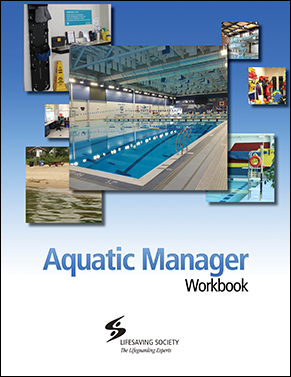Aquatic Manager certification is the Lifesaving Society’s professional designation for managers who, regardless of their aquatic background, are responsible for oversight of aquatic programs and services.
Aquatic Manager equips participants with the knowledge, principles and skills required to confidently direct excellent program delivery, responsive customer service, and attentive compliance with health and safety standards in the aquatic environment.
This checklist identifies the learning outcomes that you must achieve in order to be successful on the course.
Prerequisite: None.
Instruction & certification: Current Aquatic Management Instructors (who hold Aquatic Manager) teach and certify candidates.
Candidate recognition: Certification card.
Required references: Aquatic Manager Workbook, Guide to Ontario Public Pools Regulation (and 2025 update insert). (Note that some affiliates provide materials to candidates, and some require candidates to purchase materials on their own. Double check before you purchase.)
Instructional format: Aquatic Manager may be delivered through online learning, blended learning, or in-person learning.
Instructional time (16 hr. classroom): Actual time needed may vary depending on course format, number of candidates and the learning activities selected. One-weekend formats are common for in-person courses. Breaks require additional time. Based on 12-16 candidates.
:::

Required equipment: For in-person delivery - classroom supplies such as tables, chairs, flip charts, markers, masking tape, A/V equipment. For online delivery - computer screen with camera and audio set up required. Consideration should be given to the use of multiple screens to support delivery of the program.
Recertification: Aquatic Manager need not be recertified.
Fees: The Lifesaving Society exam fee applies to successful and unsuccessful candidates alike.
AT-A-GLANCE
The Aquatic Manager course curriculum is organized as follows:
Unit 1 - Opening Session: Intro and The Lifesaving Society. Overview of the course content and structure; confirms the performance requirements for candidates; enhances the Aquatic Manager candidate’s understanding of and relationship with the Lifesaving Society.
Unit 2 - Aquatics: Rules Rule. Develops a broad understanding of aquatic operation standards imposed by regulations, guidelines, policies and procedures; ensures comprehension of aquatic-specific employment standards and how employer guidelines impact aquatic employees; explores the aquatic manager role in ensuring compliance.
Unit 3 - Aquatic Facility Management. Enhances knowledge, skills and practices necessary to maintain safe swimming pool water; develops awareness of common risks and hazards presented by aquatic facility design and amenities, and how to put in place processes and procedures to limit risk; highlights the need for systematic and regular inspections of the aquatic environment and how to implement them.
Unit 4 - Aquatics: Key Players. Develops knowledge of the various positions and their functions within the aquatic operation; ensures a thorough understanding of the regulations, rule and standards that apply to staffing in the aquatic environment.
Unit 5 - Developing Your Aquatic Team. Ensures an understanding of aquatic-specific hiring requirements within the operation; explores what aquatic training and development is regulated, required and optional; and how these are developed, delivered and evaluated.
Unit 6 - Oversight: Safety Supervision in the Aquatic Environment. Explores the factors that influence and compromise safety in an aquatic setting; develops the skills needed to establish and monitor safety practices and protocols, and to manage the safe delivery of aquatic programs and services.
Unit 7 - Developing Aquatic Programs and Services. Provides foundational information and perspective on how to maximize access to and participation in aquatic programming while maintaining fiscal responsibility.
Unit 8 - The Aquatic Manager’s Role in Aquatic Emergencies. Develops an understanding of proactive prevention as the most important strategy in aquatic emergency management; explores the issues involved in aquatic emergencies and their implications for management.
Unit 9 - Closing Session: Evaluation and Opportunities. Provides candidates with their results and outlines volunteer opportunities within the Society.